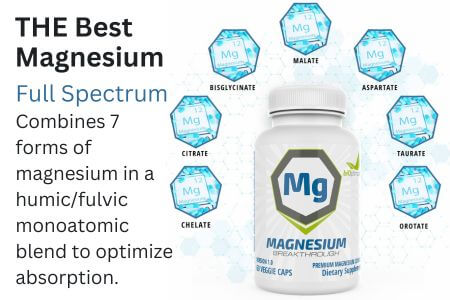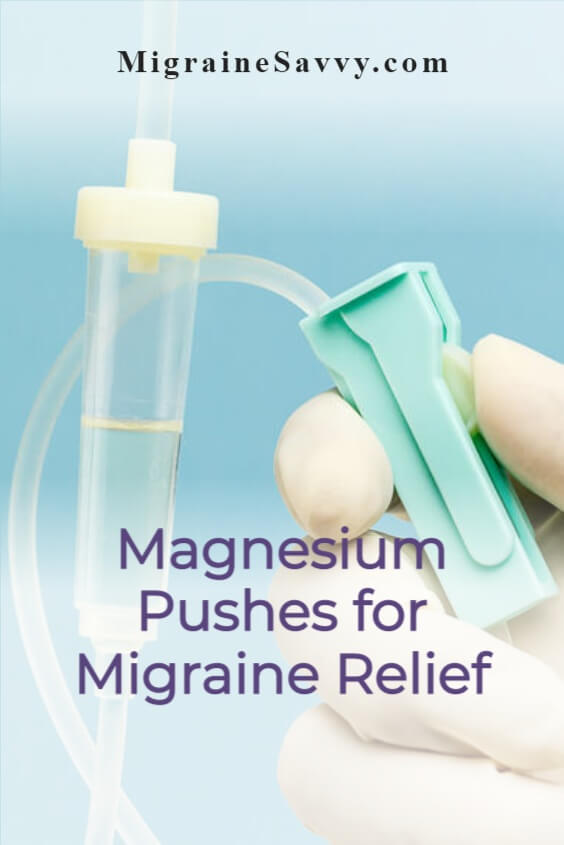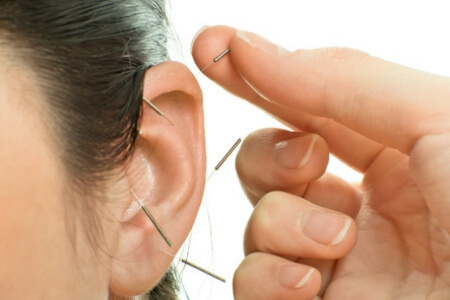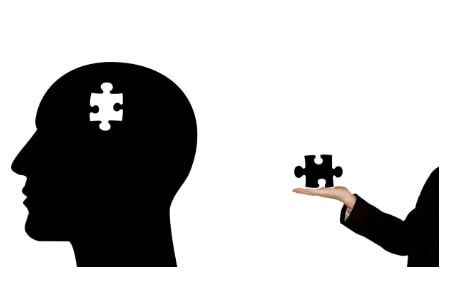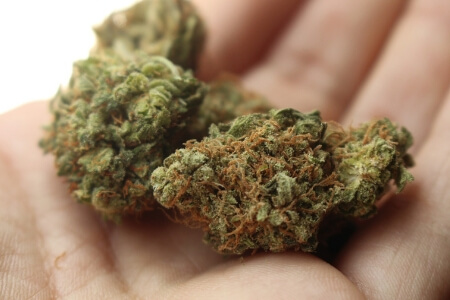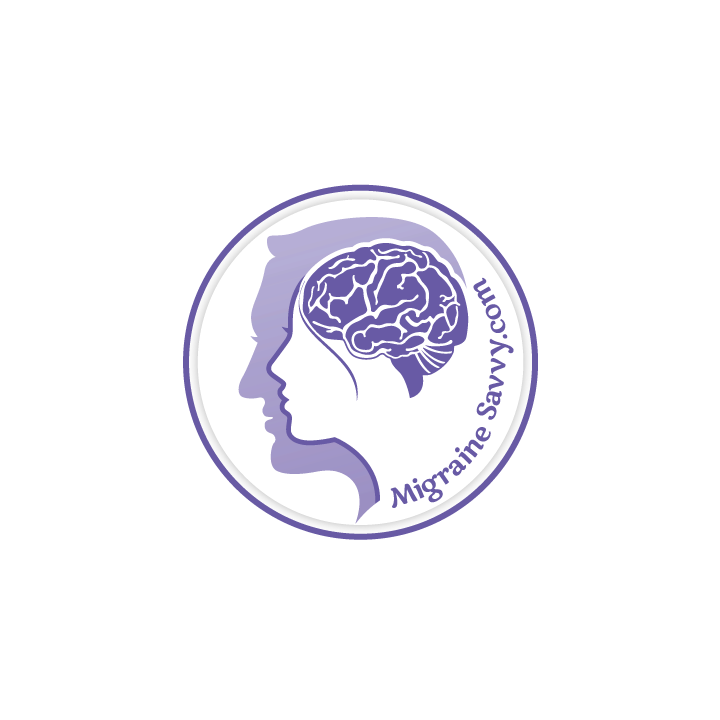- Home
- Alternative Treatments
- Supplements for Migraines
COMPLETE MAGNESIUM SUPPORT
My Top Choice - Magnesium Breakthrough - The ONLY supplement with all 7 essential magnesium types in one formula. Most only have 1-2 types, leaving you deficient.
The Top 6 Supplements for Migraines
Are you keen to prevent your attacks using supplements for migraines or something more natural than painkillers? Here are the top six most effective and scientifically proven supplements for migraines according to the American Headache Society. [2]
My #1 Choice in Magnesium Supplements
In descending order of preference:
1. Magnesium
Magnesium is the second most abundant mineral in our human cells and it is the most likely mineral for us to be deficient in being migraine sufferers.
It helps the body regulate over 325 enzymes and plays a vital role in organizing important bodily functions like muscle control and the all important electrical impulses.
This is important to calm our electrical 'storms' where
we migraineurs are concerned. It also assists in energy production
and the detoxification processes that occur naturally in our bodies. Magnesium is vital to include in your
selection of supplements for migraines.
A headache can result from magnesium deficiency alone. There are numerous studies that confirm magnesium supplementation results in significantly fewer migraine attacks following on with a reduction in medications required. Yeah!
According to my Neurologist the daily recommended dose can range from 200 to 800 milligrams depending on bowel tolerance.
Intravenous (IV) Magnesium Pushes
I tried magnesium pushes for 18 months. This is where it is slowly injected into your bloodstream to assist in stopping a migraine attack. It made me very hot and faint a few times. Afterwards, I felt significantly better energy wise and my cognitive function felt sharp. I never caught a cold.

Consequently, it never worked to abort my migraine attacks, even though I went regularly every week. It does, however, have a successful track record for many migraineurs. I recommend you give it a try.
My current doctor says that taking an epsom salt bath is one of the fastest and easiest ways to help the magnesium exchange in the body. In the summer months, when it’s just too hot to bathe, she puts me on epsom salt cream.
It is Magnesium Sulphate 25% topical cream made up (10x10mls) by a compounding chemist and comes in a syringe like delivery system – with no needle. The directions are to apply 1 ml daily and rub well into the inner wrist, behind the knees or the top of the back. It must be refrigerated to maintain a cream like consistency. It doesn't work for me :-(
My #1 Choice in Magnesium Supplements
I prefer good quality practitioner brands of supplements for migraines, so I expect good results. Oh, and this is really important... the best form of magnesium to get is glycinate or bisglycinate (not oxide). I've written more about the best magnesium types here:
Don't take just any type of magnesium... take magnesium glycinate.
2. Butterbur (Petadolex) - Petasites hybridus
I first heard of this root extract from my nutritionist friend and she recommended Life Extension brand. Please see below for Life Extension’s recommended prevention and acute doses.
There are numerous studies that prove its efficacy with migraines. One four month study with 245 migraine sufferers found that the frequency of attacks was reduced by 68 percent for those receiving 75 milligrams of the supplement twice a day when compared with a placebo.
I trialed 75mgs of Butterbur twice a day for over 18 months but am sad
to report it did not reduce my migraine occurrences or their intensity.
But most studies I found showed positive results where Butterbur is
being used.
Notes From My Little Pink Card System
Butterbur Directions
Butterbur to prevent migraines:
75 mg twice a day
For an acute attack:
1. 100 mgs every 3 hours for the first 3 doses
2. Vitamin B2 400 mgs every morning
3. CoQ10 200 mgs
4. Magnesium Sulphate 200-400 mgs twice per day unless loose stools (reached bowel tolerance)
Butterbur maintenance:
50 mgs 1 - three times a day for one month;
And then 1 – twice a day for 18 months or longer if needed.
It's safe to take 2 every 3 hours up to 6 caps for acute migraine, but check the dose on the box first, as they vary. Use one of these brands for quality butterbur:
- Life Extension Migra-Eeze which is a combination of B2, Butterbur and Ginger
- Migravent which also has butterbur extract
3. Feverfew - Tanacetum parthenium
100 mgs taken up to 4 times a day is recommended for migraines. Feverfew has been proven to reduce headaches, plus the active ingredient, parthenolide, prevents blood vessel constriction and reduces the inflammatory process in the body which can reduce migraine attacks.
Make sure your supplement has been standardized for parthenolide content, as they are pretty much useless without it.
Warning: Do not use if pregnant (or use very low dose
according to your practitioner's advice) or if you have any allergies in
the ragweed family.
Now we already know that not every supplement will work for everyone, each migraine is as individual as each individual!
According to Dr. Alexander Mauskop, Neurologist and director of the New York Headache Center, recommends daily doses of feverfew up to 600 milligrams.
You will have to check with your healthcare provider or naturopath about the right dose for you. If you do trial it yourself, be sure to keep track. Print off my medication tracker to help with this.
Click here to download and print the PDF for the medication tracker.
4. Co-enzyme Q10
The recommended dose for CoQ10 is 300 mgs three times a day. That sounds like a lot doesn’t it.
Many studies find that half of the migraine sufferers treated with this antioxidant experiences fewer attacks and less nausea than the control group after three months of treatment.
My migraines intensified when I trailed CoQ10, but again, try it yourself. Your body might like it. This is a good brand choice for CoQ10.
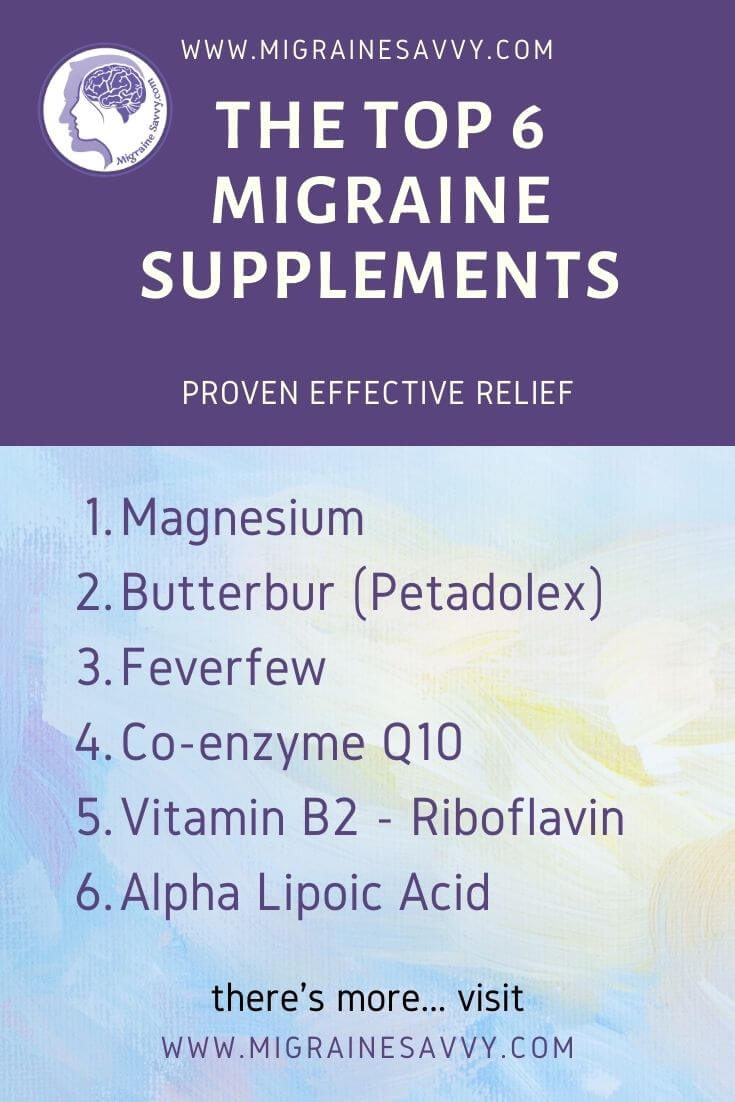 The Top 6 Most Effective Supplements for Migraines @migrainesavvy
The Top 6 Most Effective Supplements for Migraines @migrainesavvy5. Vitamin B2 – Riboflavin
Most doctors will recommend 200 mgs (milligrams) of B2-Riboflavin twice a day. This 400 mgs dose has been studied and found to help a significant number of patients with migraines. I took this for 18 months until my skin turned orange, and then my doctor took me off it.
There's a new B2 on the block to consider! The newer bio-active form of B2 called Riboflavin 5-Phosphate. Vitamin B2 is essential for activating and converting the other B vitamins. It is required for the activation of vitamin B6, the conversion of tryptophan to niacin, and the conversion of folate to its various active forms.
It is also essential for fat and glucose metabolism, red blood cell synthesis, and the production and regulation of certain hormones. This makes it one of the top supplements for migraines.
Dr. Mauskop recommends combining these four supplements for migraines for a more beneficial effect:
- 50 milligrams of feverfew,
- 200 milligrams of riboflavin (B2),
- 150 milligrams of coenzyme Q10 and
- 200 milligrams of magnesium, taken twice a day with food. [3]
As with any treatment regimen, you should consult with your healthcare provider before proceeding.
6. Alpha Lipoic Acid
Alpha-lipoic Acid provides support for healthy glucose and carbohydrate metabolism and the maintenance of healthy eyes. So it helps turn glucose into energy.
Alpha-lipoic acid can lower blood sugar levels, and its ability to kill free radicals may help reduce pain and numbness in people who have had any nerve damage caused by diabetes.
It is used as a treatment for stroke victims to improve impaired brain function and for improving blood flow and enhancing immune function, and restoring levels of glutathione.
ALA is a strong anti-inflammatory
agent. It promotes the function of other antioxidants while assisting
in heavy metal chelation. Here's the one I recommend.
Other Alternative Supplements for Migraines
Although evidence is inconclusive from mixed findings in most studies using these supplements, I want to provide a complete list and let you and your doctor decide what might be best for your individual situation.
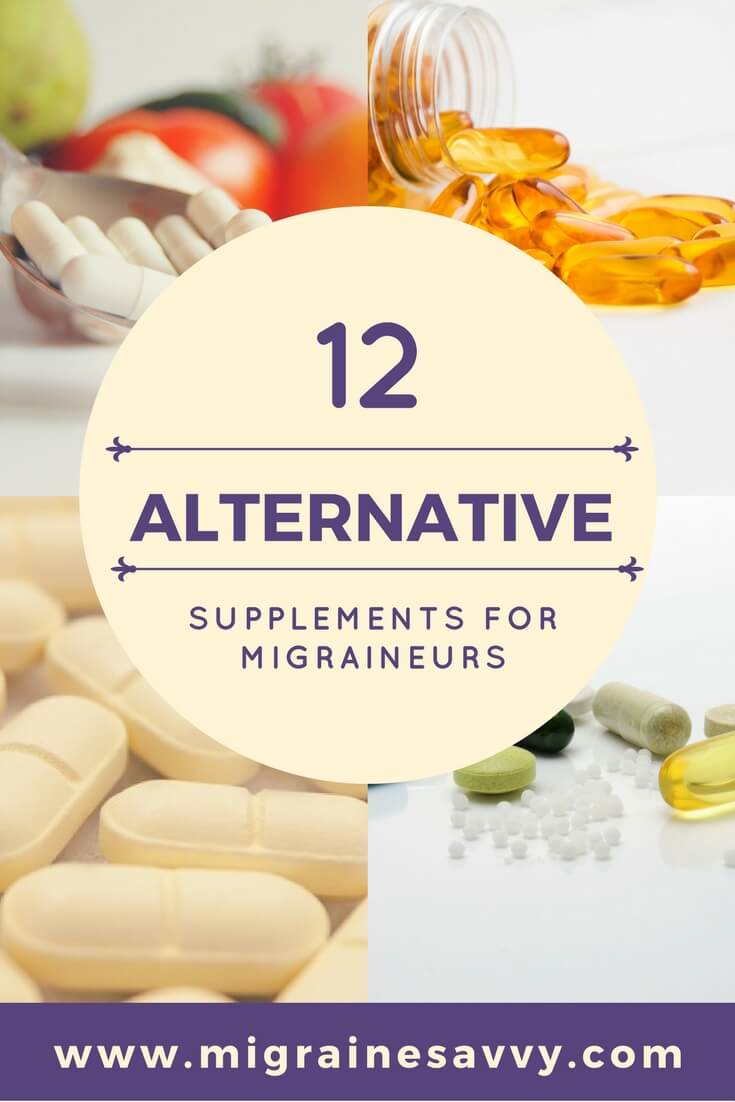 Here are more alternative supplements to help with migraine relief.
Here are more alternative supplements to help with migraine relief.
Fish Oil – High doses of 1000 mg purified is best. I use Nordic Naturals Ultimate Omega. I take 2 in the morning and 3 with dinner. I know it sounds a lot – well it did to me at first – but I am sleeping much better and feeling much clearer since investing in this supplement. Good fish oil is not cheap.
I'd recommend you start small to monitor the effects. Inositol or GABA might be more effective for helping you sleep.
Vitamin B – Complex or Forte Injections every 2 – 14 days. Injected into your bum muscle and it hurts much less when you warm the vial up in your hands first. It’s also good to massage the needle injection points between treatments so they do not form small lumps.
Vitamin B3 – Niacin (as niacinamide) 500 mgs taken at the earliest warning symptom is recommended. Make sure its the niacinamide so you don't experience too much hot flushing.
Quercetin – 500 mgs taken regularly every day. This is a bioflavonoid that can help with vascular tone. This means that the veins in your neck and head can become stronger and less likely to become overly dilated with blood.
Probiotics - containing a variety of Lactobacillus acidophilus, Lactobacillus plantarum, Bifidobacterium bifidum, and importantly for migraineurs Streptococcus thermophilus. This one ranks number one often - Culturelle Digestive Health Probiotic. Probiotics can be one of the more expensive supplements for migraines, but it is worth experimenting with.
You only take this until you are replenished with bowel flora, it's not a forever one to take! You can also check with your doctor for a good reliable safe and sufficient brand.
Vitamin C – to build up your immune system and it is often recommended for headache prevention. My body loves when I take Vitamin C. I always feel better when I take it. I highly recommend a good powder or this new Lypo-Spheric delivery system which has a much higher absorption rate.
Vitamin E – improves circulation, thus, is helpful for some people who suffer from migraines.
Pycnogenol – a powerful antioxidant.
Turmeric – for pain relief.
Taurine – to support the nervous system.
Inositol – in the family of B vitamins and is often used to ease depression.
Tyrosine – to reduce the effects of acute stress.
Questioning The Effectiveness of Supplements for Migraines
The quality of supplements you choose is important.
Try to get the best quality supplements for migraines you can afford to take for a while. It might take a few months to get the desired results.
Ask your healthcare practitioner for the best quality brand they can recommend for you.
Migraine for Dummies says that “getting rid of a full-fledged migraine with nothing but herbal remedies ranks right up there with cleaning up an oil spill with tissues”.
So be aware that you may require a stronger method of treatment for your migraine episodes.
As you can see there are so many different supplements for migraines and headaches available. I am sure I have not listed them all and new discoveries are being made all the time.
Some of these above have not passed through the most stringent clinical tests but the first six have been rigorously tested and succeeded through controlled clinical trials proving their efficacy.
No matter what you eventually decide upon to try for your migraine treatment, always discuss it with your doctor first.
This is a complex neurological medical condition and the supplements for migraines, herbs, alternative treatments, and medications you choose to use should not be taken without checking for contraindications or drug interactions.
Stay well, and I wish you great success using supplements for migraines as natural prevention.
Click here for the brands I recommend >>
WANT MORE TIPS? Subscribe to my newsletter and follow along on Facebook and Pinterest for all of the latest updates.
ALTERNATIVE MIGRAINE TREATMENTS Related Articles
How to be more MIGRAINE SAVVY right now...
Supplements for Migraines References:
1. Stafford, D and Shoquist, J. MD (2006) Migraines for Dummies. Wiley Publishing Inc: NY.
2. American Headache Society – US Library of Medicine – PubMed.gov.
Sun-Edelstein C, and Mauskop A. (2011) Alternative headache treatments:
nutraceuticals, behavioral and physical treatments. Headache. Vol. Mar;51(3):469-83. Review. PubMed.
3. American Headache Society – US Library of Medicine – PubMed.gov.
Sun-Edelstein C, and Mauskop A. (2009) Foods and supplements in the
management of migraine headaches. Clin J Pain. Vol. Jun;25(5):446-52. Review. PubMed.
